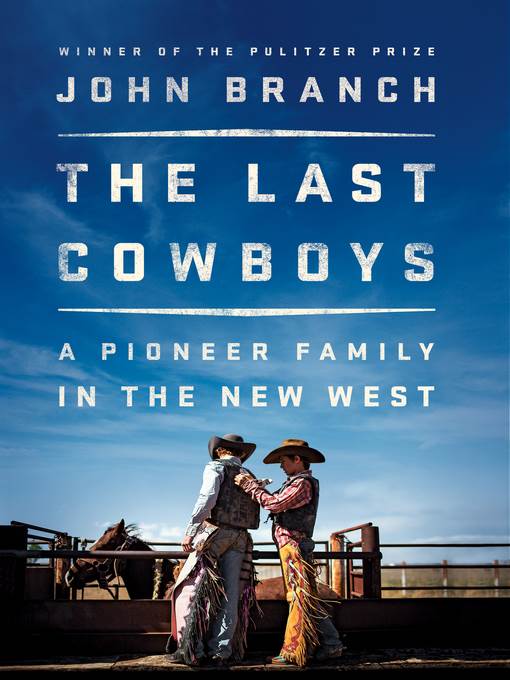
The Last Cowboys
A Pioneer Family in the New West
- اطلاعات
- نقد و بررسی
- دیدگاه کاربران
نقد و بررسی

February 15, 2018
Pulitzer Prize-winning New York Times reporter Branch (Boy on Ice: The Life and Death of Derek Boogaard, 2014) immerses himself in a huge Utah family to understand contemporary cattle rearing, rodeo riding, and the endangered environment of the American West, which is owned primarily by the American government but leased to private ranchers.The Wright family goes back more than 150 years in rural Utah; their initial settlers were part of the Mormon migration in the 1850s. "Americans weren't always known for their roots," writes the author, "but the Wrights had them planted in the red soil of Smith Mesa before the transcontinental railroad was connected up north, decades before Utah was an official state." Bill and Evelyn have raised 13 children in Smith Mesa. These children, plus an ever growing brood of grandchildren, populate the narrative, which is focused mostly on the men due to the rodeo thread. Branch tells the saga in mostly chronological fashion based on his time with the family, with historical flashbacks and occasional flash-forwards mixed in. The rodeo thread focuses on the sons (and a few of their sons), most of whom have succeeded at the highest levels in their sport. Participating in rodeos provides them with both monetary rewards and a sense of competitive pride, not to mention plenty of broken bones and head injuries. The cattle-rearing thread focuses primarily on patriarch Bill; his children and grandchildren pitch in at times, but caring for the herd is his passion. As the story progresses, the grazing land begins to wear out, federal regulators keep watch, corporate cattle operations swallow the industry, and tourism encroaches. All the while, Bill wonders how many more years his business will remain viable.Packed with fascinating information, lively writing, and a certain pleasant nostalgia, this book is a good candidate for reading one chapter per day; eventually, the narrative becomes unwieldy--too many family members to track easily, too many long drives to rodeo after rodeo, and too many abrupt narrative shifts from cattle to rodeo to environmental degradation.
COPYRIGHT(2018) Kirkus Reviews, ALL RIGHTS RESERVED.

February 19, 2018
Pulitzer Prize–winning reporter Branch (Boy on Ice) develops his 2015 New York Times article on a successful rodeo family into a full-blown tale of modern life on the range in southern Utah. The book focuses on the Wrights, a family of cattle ranchers and world champion saddle-bronc riders, as they struggle to hang on to land that’s been in their family for more than 150 years. It’s also the place where Bill Wrights and his wife, Evelyn, raised their 13 children, including seven sons, all of whom have gone on to become famous rodeo riders. But the older Bill gets, the harder it is for him to look after the land, especially amid numerous conflicts with the Bureau of Land Management and a flurry of buyout offers from commercial developers. Branch writes with immediacy when describing cowboy life, whether branding and castrating cattle (the “dirt-covered testicles... looked like dusty pearl onions”) or attempting to last eight seconds on the back of a wild and angry mustang (a fallen rider “crashed clumsily on his left shoulder, and the pain shot through him like electricity”). Branch’s fly-on-the-wall reporting and evocative prose renders this a memorable tale of family and the American West in a state of flux.

April 15, 2018
This elegantly written account of the extraordinary Wright family of southern Utah succeeds in showing the challenges facing modern Western American ranchers. Pulitzer Prizewinning journalist Branch (Boy on Ice) integrated himself with the family to produce an intimacy with world-class rodeo saddle-bronc riders, government land administrators, and hundreds of bawling cattle. Branch relates how rodeo prize money dramatically saved and improved the Wright's traditional ranching business, even while battering family members with uncountable broken bones and sacrificing critical family time. Far less political than James Pogue's account of the Bundy family (Chosen Country), Branch's take nonetheless portrays ranchers faced with restrictive federal government land policies and a significant increase in recreational users of the same lands they lease for grazing rights. VERDICT A dramatic and personal account of the Wright family and how they developed a second business in the modern rodeo circuit to support their family ranch at Smith Mesa. Recommended for understanding 21st-century American cowboy culture.Nathan Bender, Albany Cty. P.L., Laramie, WY
Copyright 2018 Library Journal, LLC Used with permission.

Starred review from March 15, 2018
Pulitzer-winning New York Times reporter Branch records in utterly enthralling detail the efforts of a multigenerational Utah ranching family, the Wrights, to survive a shifting American West. As patriarch Bill Wright and his beloved wife, Evelyn, struggle to nurture their small herd of cattle?whether branding, repairing fences, or navigating regulations placed on the federal land they lease?their sons, and their sons' sons, take to the rodeo circuit, riding broncos to supplement the family income and giving author Branch an oddly juxtaposed dual narrative of a family both working the land and forced by financial circumstances to forsake it. In letting the Wrights' story slowly unfold itself, Branch conveys the timeless, almost mystical appeal of ranching in America's west, even as Bill Wright, knowing the economic and social forces against him, decides in the end that it could work to allow women to set up a dozen tents down in the hollow for tourists. Heck, he could charge them (a lot) to help round up his cattle.(Reprinted with permission of Booklist, copyright 2018, American Library Association.)




دیدگاه کاربران